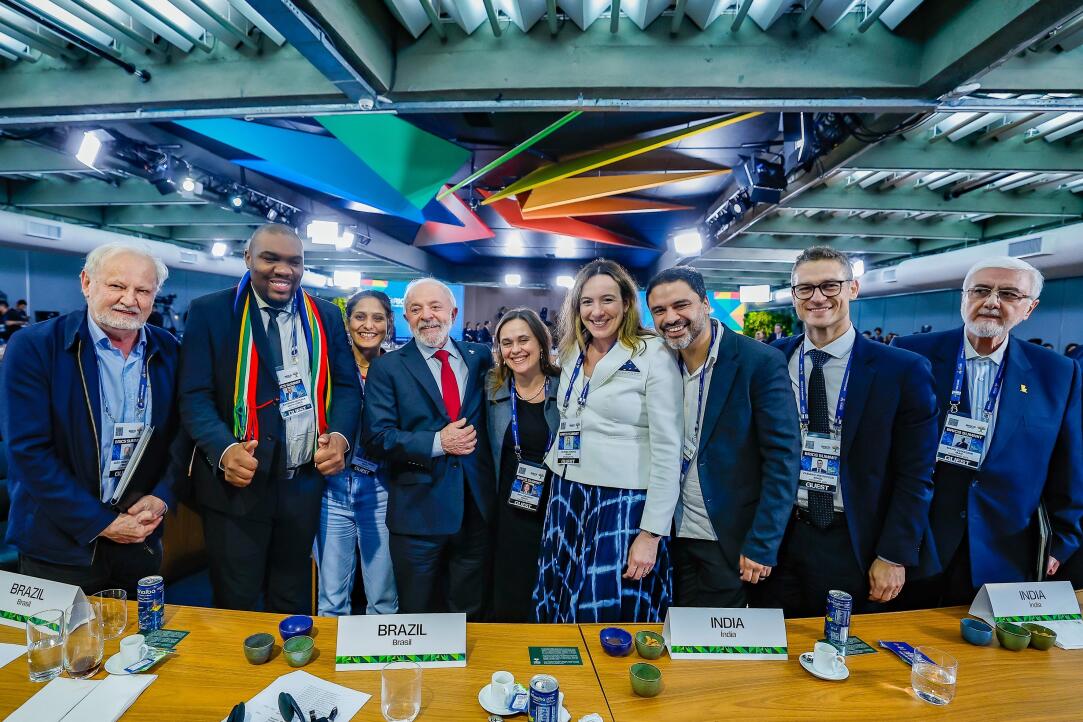HSE Takes Part in BRICS Summit

On July 6–7, 2025, the 17th BRICS Summit took place in Rio de Janeiro. For the first time in the organisation’s history, representatives of civil society from BRICS countries participated. HSE Vice Rector, Head of the BRICS Expert Council–Russia, and Co-Chair of the Russian Chapter the BRICS Civil Forum Victoria Panova attended the meeting of the bloc’s national leaders.
In the run-up to the summit, a special session of the Civil BRICS Council was held in Rio de Janeiro on July 4–5. Representatives of civil society from the member countries reached consensus on a set of recommendations, which were formally presented to the heads of state on July 6 during the summit.
The presentation of these recommendations at the highest level marked the culmination of months of work within the BRICS civil track, which brought together over 120 public organisations from BRICS member and partner countries. Since the beginning of the year, dozens of online consultations had been held to develop a coordinated position. In April and May, HSE University hosted roundtable discussions involving the Russian chapter of the Civil BRICS Council, during which thematic working groups drafted position papers. A key milestone in the preparation process was the first on-site session of the Civil BRICS Council, held on July 4–5 in Rio de Janeiro. The special session brought together delegations of civil society activists, experts, and academic representatives from BRICS countries and their partners.
The final document outlined proposals across seven key areas of the Global South’s agenda. The recommendations focus on enhancing cooperation in the social, economic, technological and cultural spheres, expanding academic exchange, strengthening digital sovereignty, promoting sustainable development, and formalising civil society participation within the BRICS framework. Collectively, they reflect a desire for a fairer and more equitable world order in which the interests of developing nations and the voice of civil society play an increasingly prominent role.

Victoria Panova
‘Civil BRICS is not just a movement. It is not merely a club. It is a family. For the first time, we can say that BRICS represents a qualitatively new form of international alliance. Civil BRICS is an important complement to this, as the process clearly demonstrates how close we are and how much we can accomplish together for the benefit of our peoples,’ noted Victoria Panova. She added that the formalisation of the Civil BRICS Council was made possible through the combined efforts of all member states, with crucial institutional steps taken during Russia’s presidency in 2024.
The establishment of the Civil BRICS Council was enshrined in the Kazan Declaration in July 2024. It became a natural continuation of the BRICS Civil Forums held annually since 2015. Over the past decade, this track of public diplomacy has evolved into a permanent platform for dialogue between civil society organisations and BRICS governments.
For several years, HSE University has been providing expert support for civil society engagement within the BRICS framework. The university actively contributes to shaping Russia’s people-to-people agenda and helps to promote the values of equitable dialogue, sustainable development, and inclusive community involvement in international cooperation processes.
The next on-site meeting of the Civil BRICS Council is scheduled for October 2025 in the city of Salvador, Brazil. It will continue the discussion of implementation mechanisms for the proposed initiatives and explore ways to broaden the participation of Global South countries in the bloc’s agenda.
See also:
HSE Scientists Optimise Training of Generative Flow Networks
Researchers at the HSE Faculty of Computer Science have optimised the training method for generative flow neural networks to handle unstructured tasks, which could make the search for new drugs more efficient. The results of their work were presented at ICLR 2025, one of the world’s leading conferences on machine learning. The paper is available at Arxiv.org.
Neural Network Trained to Predict Crises in Russian Stock Market
Economists from HSE University have developed a neural network model that can predict the onset of a short-term stock market crisis with over 83% accuracy, one day in advance. The model performs well even on complex, imbalanced data and incorporates not only economic indicators but also investor sentiment. The paper by Tamara Teplova, Maksim Fayzulin, and Aleksei Kurkin from the Centre for Financial Research and Data Analytics at the HSE Faculty of Economic Sciences has been published in Socio-Economic Planning Sciences.
Larger Groups of Students Use AI More Effectively in Learning
Researchers at the Institute of Education and the Faculty of Economic Sciences at HSE University have studied what factors determine the success of student group projects when they are completed with the help of artificial intelligence (AI). Their findings suggest that, in addition to the knowledge level of the team members, the size of the group also plays a significant role—the larger it is, the more efficient the process becomes. The study was published in Innovations in Education and Teaching International.
Advancing Personalised Therapy for More Effective Cancer Treatment
Researchers from the International Laboratory of Microphysiological Systems at HSE University's Faculty of Biology and Biotechnology are developing methods to reduce tumour cell resistance to drugs and to create more effective, personalised cancer treatments. In this interview with the HSE News Service, Diana Maltseva, Head of the Laboratory, talks about their work.
Master’s Students of HSE, University of Campinas, and Tsinghua University Publish Joint Student Research Collection
Master’s students of the HSE ISSEK programme ‘Science, Technology and Innovation Management and Policy’ have released a joint research collection with the University of Campinas (Brazil) and Tsinghua University (China) titled ‘Being Innovative or Being on the Safe Side—Managing the Risk of Failure.’ The authors explore how organisations perceive risks and embrace innovation within different cultural contexts.
‘A Turn Away from Stereotypes’: Moscow Hosts ‘Researching the Deaf Community’ Conference
On October 17–19, 2025, the third annual interdisciplinary conference ‘Researching the Deaf Community 2025: on the Periphery of Attention’ took place at GES-2 House of Culture in Moscow. The event was organised with the participation of the HSE International Laboratory for Social Integration Research. HSE University Vice Rector Irina Martusevich addressed attendees at the opening ceremony.
Exploring the Mind: HSE Scientists Discuss Cognitive Technologies of the Future
Why we make irrational decisions, how the brain responds to fakes, and whether neural networks are capable of thinking—these were the topics discussed by early-career scientists of HSE University during the NAUKA 0+ science festival. The event brought together students and experts from various fields, united by a common goal—to deepen their understanding of the human brain and cognitive technologies.
HSE Researchers Assess Creative Industry Losses from Use of GenAI
Speaking at the IPQuorum.Music forum on October 15, Leonid Gokhberg, HSE First Vice Rector, and Daniil Kudrin, an expert at the Centre for Industry and Corporate Projects of HSE ISSEK, presented the findings of the first study in Russia on the economic impact of GenAI on creative professions. The analysis shows that creators’ potential losses could reach one trillion roubles by 2030.
International Dialogue on Urban Development: Dynamic Urbanism and Green Infrastructure
In September 2025, the HSE Faculty of Urban and Regional Development (FURD) hosted a delegation of leading scholars and urban development experts from China. Two seminars were held at the Shukhov Lab with the participation of Chinese colleagues: the first focused on green infrastructure, while the second explored the theme of dynamic urbanism. In addition, a meeting between the Chinese delegation and representatives of FURD took place at the university’s main building on Pokrovsky Bulvar. The participants discussed opportunities for expanding cooperation between universities and research centres.
HSE Tops the Ranking of Universities with the Best Employer Reputation
On October 16, 2025, Forbes Education published its list of the top 20 Russian universities with the best employer reputation in 2025. The ranking was based on a survey of leading Russian employers, who named the higher education institutions whose graduates they consider the most well-prepared and are most inclined to hire. HSE University took first place in the ranking.


